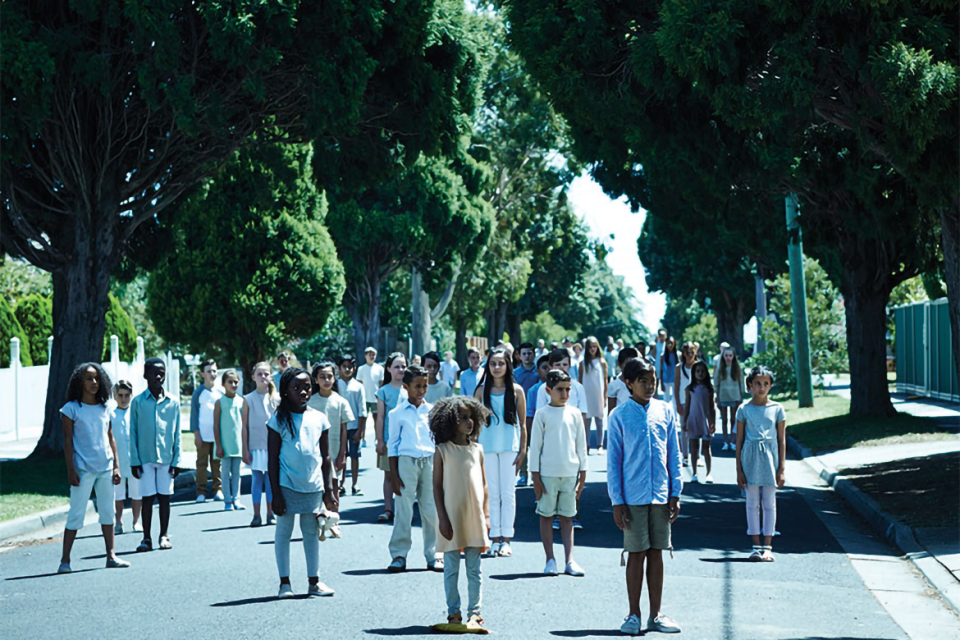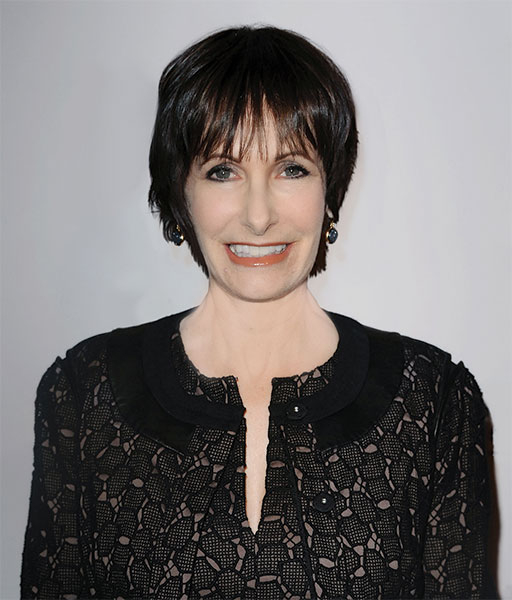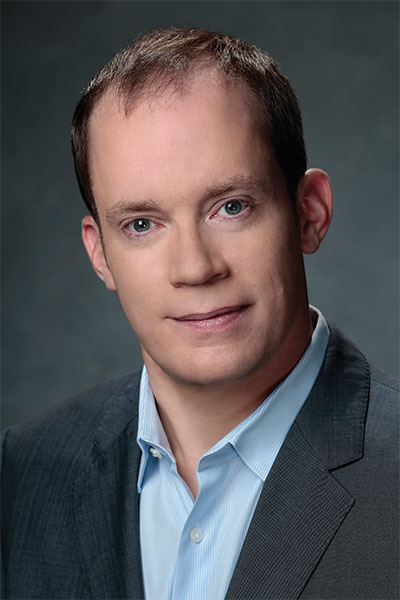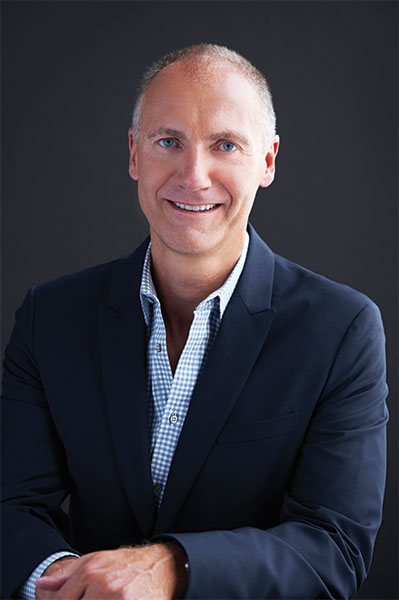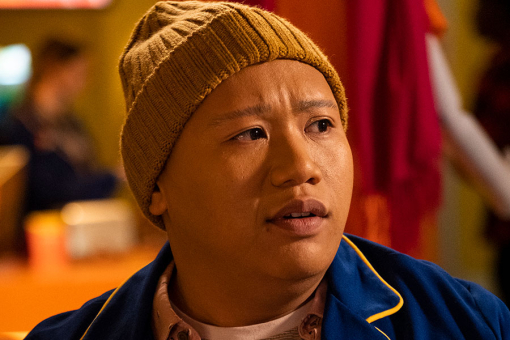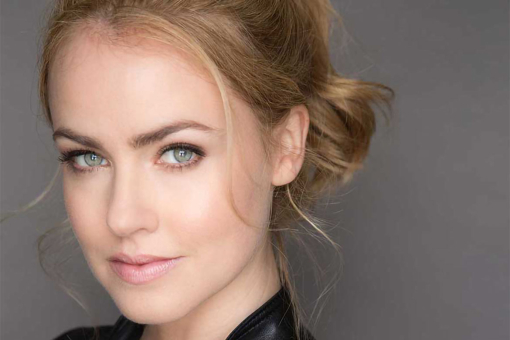Last November. on a clear and chilly spring day in Australia, executive producer Gale Anne Hurd headed to an abandoned warehouse a few miles north of Melbourne.
She was joining Syfy marketing executives at a site once used by communication tech giant Ericsson for a photo shoot for the network's upcoming series Hunters.
Though Hurd boasts one of the biggest names in genre TV thanks to her megahit, The Walking Dead, she was prepared to sit on the sidelines with showrunner-executive producer Natalie Chaidez while network brass called the shots.
But something unexpected happened. Before stars Britne Oldford and Julian McMahon began striking their poses for the key art that would soon emblazon bus rears and billboards, Hurd and Chaidez were enlisted as full participants in the marketing decision-making.
"Natalie and I were there, collaborating and even giving direction just to make sure that the actors were in character," Hurd recalls.
"A gallery shoot can be a very stilted thing that doesn't reflect the show. But Syfy completely embraced Natalie and me and said, 'We should have environments that are consistent with the show. That will help create not only a really cool look but enable our actors who have been in those settings for so long to bring their characters to life.'"
From Hurd's perspective, it was a dramatic departure from her typical interplay with a network. "On a lot of shoots, you're basically allowed to watch, but you can't interact," she explains. For the network that has morphed in recent years from low-budget, often cheesy roots to a destination for high-quality, story-driven programming, it was a no-brainer to solicit the input of the series' principals.
"When we have somebody as prolific as Gale, when you look at her resumé, particularly in the sci-fi space, you'd better listen," says Bill McGoldrick, executive vice-president of original content at Syfy. "We want to be the most talent-friendly network out there, and part of that is simply listening. They're living with these shows 24/7. Why wouldn't you want to listen to people who are in it every single day?"
Since its rebrand in 2009 from Sci-Fi Channel — home of fanboy fave Battlestar Galactica — to the more phonetically friendly Syfy (coupled with the tagline "Imagine Greater"), the network has solidified its position as one of the top three contributors to Bonnie Hammer's NBC Universal Cable Entertainment Group, a sprawling portfolio that includes 10 networks and two cable studios.
At press time, the network was expecting double-digit profit growth for 2015 while anticipating an increase in 2016, despite a basic-cable climate of stagnation and loss.
Those earnings have allowed Syfy to assemble its most ambitious slate in its 23-year history. While the network still makes room for a campy Sharknado (the fourth installment in the social media-driven phenom will air in July), it will unleash a spate of edgy programming in 2016 to accompany Hunters.
The lineup includes 12 Monkeys (an adaptation of Terry Gilliam's apocalyptic feature), which returns for a second season on April 18, as well as the limited anthology series Channel Zero from Nick Antosca (Hannibal) and Max Landis (breakout film Chronicle), which will air two self-contained, six-episode seasons in fall 2016 and 2017.
The network is also in production on the pilot for the futuristic espionage thriller Incorporated (from Matt Damon and Ben Affleck's Pearl Street Films) and a 13-episode grindhouse movie homage, Blood Drive, in which cars are powered by blood.
Further out, Syfy is teaming with Steven Spielberg's Amblin Television for a scripted series based on Aldous Huxley's sci-fi classic Brave New World. The network also is collaborating with Bradley Cooper, Graham King and Todd Phillips for Hyperion, based on Dan Simmons' best-selling novel that kicks off on the eve of Armageddon with the entire galaxy at war.
Also in the works: a Superman prequel titled Krypton, which was developed by David S. Goyer and follows the arc of the Man of Steel's grandfather. On the horizon as well is Arthur C. Clarke's 3001: The Final Odyssey, which brings sci-fi maestro Ridley Scott and his Scott Free Productions into the Syfy universe,
Hammer, chairman of NBCU Cable Entertainment & Cable Studios, sums up Syfy's new sensibilities this way: "It's hipper, a little grayer, a little sexier, but it still lives in a science-fiction world. Science fiction is hotter than ever, and we want Syfy to be at the forefront. We're making a significant investment to develop the biggest, boldest, most ambitious sci-fi programming you'll find anywhere."
Syfy president Dave Howe, who oversees a staff of 150 in New York and Los Angeles (he's also president of the Chiller network), pinpoints the turnaround to 2013, about the same time McGoldrick joined the network from USA.
"We strategically figured out who we wanted to be and where we wanted to go," explains Howe, who came aboard in 2001 as a marketing executive.
"We'd looked at the explosion of competition in the marketplace. We'd looked at the doubling of volume of genre shows across broadcast and cable. And we asked ourselves, 'How do we compete?' And the answer to that question is, we have to be seen as the ultimate destination for the smartest, most provocative science-fiction entertainment that we can be."
After all, it took some soul-searching to understand why two rival networks — AMC and HBO — were home to Walking Dead and Game of Thrones, respectively, two of the biggest TV hits of the past decade, both with sci-fi elements. As a result, Syfy became markedly more aggressive in courting A-list talent and buzz-worthy intellectual property.
The fruition of that game plan was perhaps most evident during a single week in mid-December, when the network simultaneously launched the drama series The Expanse (from Mark Fergus and Hawk Ostby, the writers behind Iron Man and Children of Men), a sneak peek of the fantasy series The Magicians (based on Lev Grossman's best-selling trilogy of books) and the six-hour mini-series Childhood's End (perhaps sci-fi patron saint Clarke's most beloved book).
"That week alone, I don't think there were any other networks in cable that provided nine hours of the highest-quality content," Howe says. "That was a blockbuster week for us in terms of positioning ourselves as the network for this kind of content."
On the ratings front, The Expanse garnered strong multiplatform attention, with 4.5 million viewers tuning in to the two-night premiere in December. The network quickly gave a green light to a second season of the politically minded futuristic drama, upping the episode order from 10 to 13.
As for The Magicians' sneak peek, Howe says he was overwhelmed by the word-of-mouth response and believes that its core audience was sufficiently enticed. The series officially premiered in late January.
The Magicians certainly benefited from a strong lead-in via Childhood's End, a miniseries from executive producers Matthew Graham and Michael De Luca that drew 7.9 million viewers over a three-night run (The Magicians aired after the finale).
Across the three nights in December, Syfy ranked as the number-three cable entertainment network in primetime among total viewers, number four in the key 25-to-54 demographic and number five among adults 18-to-49, outperforming Discovery, Food, History, HGTV, TNT and VH1, among others,
For De Luca, the seasoned film executive and producer behind Fifty Shades of Grey and The Social Network, it marked a rare move to the smaller screen. But he says Syfy never scrimped on the budget, which he describes as high-end for basic cable.
"I thought they gave us a nice budget for what we had to do," he says. "And in a way, the budgetary limitations were great because the spectacle of the book had been kind of pilfered in [movies like] Independence Day and Close Encounters of the Third Kind.
So even if we had had more money and put a lot of spectacle on the screen, we just would have looked like we were derivative. This forced us to be creative and really concentrate on the characters and the drama."
Even more impressive to De Luca was the level of enthusiasm he encountered within Syfy's Universal City, California, offices.
"Everyone there is a sci-fi fan, so you feel like, 'They're going to make really good science fiction,'" he says. "The [executive] notes were great. They'd all read the book. You never know in feature meetings if the people writing the notes have really read everything. And these guys were fanboys just like us."
Sci-fi is clearly cresting as the go-to genre that can readily translate outside the United States.
Consider the record-breaking box office of Star Wars: The Force Awakens or the global success of Walking Dead and Game of Thrones. Syfy, which is available in 87 countries in addition to the U.S., is well poised to sate the international appetite for imagined settings that still echo timely issues like immigration, terrorism and the toll of technology.
"Syfy is the perfect network to ride the wave that science fiction, fantasy and horror have enjoyed," says producer Hurd. "When they told me they were rebranding — and [Hunters] is the kind of project that fits perfectly within a rebranding of a network — I thought, I'd rather be part of that rebranding than, 'Okay, it's all figured out now.'"
As it forges its new destiny, Syfy will continue to rely on sister company Universal Cable Productions, the studio behind Hunters, Childhood's End and The Magicians as well as 12 Monkeys, Channel Zero and Brave New World. In fact, roughly 40 percent of the studio's programming lands at Syfy (another 40 percent winds up at sister network USA, while the remaining 20 percent is sourced externally).
The feeder studio also boasts such executive producers as Hurd among its in-house stable (in May she set a new overall deal with UCP for her Valhalla Entertainment). Jeff Wachtel, UCP president and chief content officer, says lining up top-tier sci-fi talent is his primary goal.
"Our job is to be so attractive that that level of talent is thinking about us first," he says. "We want Syfy to become the place that when the Spielbergs and J.J.s [Abrams] and George [R.R.] Martins of the world think about their next project, they're thinking, 'The perfect home for this would be Syfy.'"
Beyond refining its identity, Syfy is looking to build on its status as a top-10 network in all three key male demographic categories among ad-supported cable entertainment networks. Considering the increasingly cramped and challenging television landscape, the network pulled off quite a feat when it ended 2015 ranked in key demographics in the same place it ended 2014,
"Over time I think our investment will pay back and people will start to redefine and reposition Syfy as a brand and as a network," Howe says, "and give us the recognition we deserve — [for] bold, ambitious, premium content."
But perhaps of most importance to Hammer and Howe is Wall Street's reaction to the brand overhaul. Bank of America/Merrill Lynch's Jessica Reif Cohen, a top analyst of entertainment and media stocks, sees Syfy moving in the right direction.
"TV viewers are becoming more discerning and demanding in getting quality content, given the proliferation of choices across all platforms," she says. "It is critical to have a strong, well-identifiable brand that will attract a key target demo. NBCU has an opportunity to really drive up the value of its cable networks by creating must-have brands."
As it navigates its own brave new course, Syfy is eyeing a future that is anything but dystopic. To Howe, that means staying true to the core fan base while broadening its audience with universal content, offering programming that questions what it means to be human and where the species is heading — whether in the far-flung future or the present. Says the network head "That's what the genre does best."
EDITOR'S NOTE: Since this article went to press, Dave Howe has moved from president of Syfy to President of Strategy and Commercial Growth for NBCUniversal Cable Entertainment, and Bill McGoldrick has moved from executive vice-president of original content at Syfy to Executive Vice-President of Scripted Content for NBCUniversal Cable Entertainment.
For more on the novelists behind some of Syfy's latest programming, see our Online Original article "Novel Ideas."



